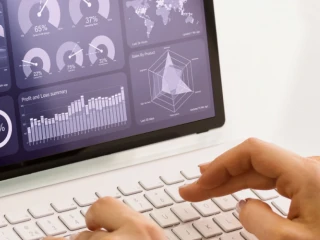Levels
of reporting
“The choice between Tableau and CRM Analytics ultimately comes down to the level on which you’re reporting,” says Charlotte Bayart, Data & AI consultant at delaware. “For business reports on a management level, Tableau will most likely be the better choice as there is no need for real-time data. In addition, it allows you to bring multiple data sources together, and its powerful visualizations help you get your point across easily.”
“However, when you need operational reporting on your CRM data to immediately take action, an embedded solution like CRM Analytics is definitely the way to go. Because there are no additonal layers between reporting and data sources, embedded solutions offer more powerful and detailed insights. What’s more, users can take immediate action on insights, without requiring an additional tool. Most of the times it will make perfect sense for an organization using Salesforce as a CRM platform to rely on both tools at the same time.”
Looking to take your reporting capabilities to the next level? Get in touch with Charlotte Bayart to learn more.
/AdobeStock_95779510-(1).webp?mode=autocrop&w=320&h=320&attachmenthistoryguid=b4de06e8-df81-474c-888a-e7829c046d3d&v=&focusX=4814&focusY=1733&c=ce82747a3ddc0dfa5fef637723b57801956f0ee1f532f0aadf49bf07d61cd0d6)


/Website_Landingpage_new_DataAnalytics_1920x355-(1).webp?mode=autocrop&w=320&h=240&attachmenthistoryguid=f7c84915-cf28-4a9d-83a0-ba3a7f12e562&v=&focusX=557&focusY=151&c=d62544587aa601fd6356e8e13a967670c5729116d101f7e9a52bb095c3b63d68)